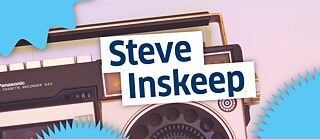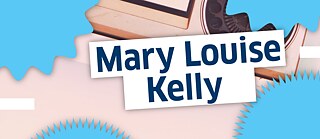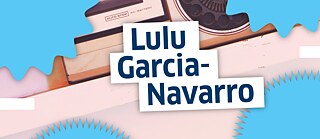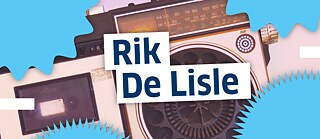Zeitgeister On Air Radio Around the World #1 mit Steve Inskeep

Die Morning Edition von NPR ist fester Bestandteil des öffentlichen Rundfunks in den USA – und Steve Inskeep moderiert die Show seit fast zwei Jahrzehnten. Soraya Sarhaddi Nelson spricht mit ihm über seine liebsten Radioanekdoten, sein einprägsamstes Erlebnis als Moderator bei NPR und mehr.
Podcast abonnieren: Apple Podcasts | Spotify | RSS
Transkript
[Music]
Soraya Sarhaddi Nelson: Welcome to Radio Around the World, brought to you by Goethe-Institut. I’m your host, Soraya Sarhaddi Nelson of Common Ground Berlin. Today we’ll meet a radio icon who you’ll no doubt recognize if you’ve ever heard public radio in the United States. [MUSIC] This Indiana native has hosted NPR Morning Edition for nearly two decades and has recorded his show in some interesting places. For example with me, while we floated down the Nile on a traditional Egyptian boat called a Felucca. I asked Steve Inskeep about his favourite radio memories.
Steve Inskeep: I remember when my family used to drive from Indiana to Florida at Christmas time. We would get in the car and drive as many as 24 hours to various locations in Florida and spend a week down there. And on the way we would turn on the radio and you’d listen all night. And because I’m 55 this was before there was, you know, the internet and people were looking at phones – and it was kind of magical that you’d be driving through Tennessee and be hearing a basketball game in the middle of the night from Iowa hundreds of miles away on an AM radio station, and it just went through the air. And I loved that. I loved it when I was a little kid and it was late at night and we would drive all night. And I would be assigned to sit up front with my dad and supposedly keep him from falling asleep. I remember the smell of the coffee when my mom would open the thermos and the smell would fill the car. I loved that. I remember the crackling static and hearing the ball games on the radio.
Soraya Sarhaddi Nelson: So, did that influence your decision to choose a career in radio?
Steve Inskeep: Yes. I didn’t grow up thinking I’m going to be in radio but I grew up loving the radio. I have so many really specific vivid memories like the one that I described. My brothers and I still joke about particularly ridiculous things we heard on the radio during these trips, or an advertisement in Kentucky that we heard 14 times on our way across Kentucky. I have memories of listening to the Indy 500, a 500-mile car race in Indiana, on the radio. I have memories of listening to Purdue University football and basketball games on the radio. And then when I got to high school, there was a high school radio station and I had an opportunity myself to call play-by-play a football and basketball games. I guess I should explain when I say football, I mean American football – this ridiculous and deadly sport that we have in the United States. I got to do that on the radio and so I'd had this, kind of, living experience with it before I thought of it really as a career.
Soraya Sarhaddi Nelson: Was it difficult to be able to do this play-by-play on radio of football? I mean at this time I assume that TV was coming into play.
Steve Inskeep: Absolutely, of course, I mean I’m not that old. I mean there was television but if you’re listening to the radio you needed to paint a picture of the motion on the court. You needed to, like, remember a million numbers of people and try to remember names and all that. But you were trying to give the sense of what the pass looked like as it went through the air; of what the field was like if it was raining and muddy; what the brutality of a hit may have been. And I found that really exciting and it was phenomenal practice for what I do now. And you guys know this very well because you have reported from many different places and broadcast back to Berlin or broadcast back to the United States and you’re trying to describe a crowd on the streets of Cairo. And a couple of sentences and just a little bit of sound can sometimes take people there in a more intimate way than the video would. The television image from someone’s hotel balcony, looking down on the millions of people, that’s one thing. But to be down in that crowd and to hear what it’s like to be down in that crowd is an entirely different experience. I think of it, I mean if I do it well – somebody else will decide if I do it well, but if I do it well I think of it almost like novel writing. The way that you feel like you had the experience that the character in a well-written novel is having. And it’s the little details that you capture – the little sense of motion, the way someone’s arm looks or the way their head is tilted or the way a car rolls by just as you’re making a particular point that takes people there.
Soraya Sarhaddi Nelson: You’ve been at NPR for more than two decades, much of it hosting morning edition. What is the most memorable experience you’ve had as a host there?
Steve Inskeep: I could name a lot but I guess I’ll name some road trips that we have taken. There was a road trip that a couple of colleagues and I took from Tunis across Libya to Cairo in 2012 – which was probably the only year in recent history, and the only few months of that year in recent history, when that trip was possible. It was after the fall of Muammar al-Gaddafi, the leader of Libya during the Arab Spring, and before an attack in Benghazi, Libya that killed the US ambassador Chris Stevens, this little window of time. And we started in Tunis talking with people across these three countries that had been affected in different ways by the Arab Spring. We drove across Tunisia and across the border into Libya and we stopped in Tripoli and we met Chris Stevens, the US-ambassador then, and we continued down the coast and stopped in ancient Roman cities. Leptis Magna in Libya seems to me to have more preserved Roman ruins all in one place than probably Rome and it’s like they just left – the stuff is just all sitting there. The roofs are gone but the walls and the streets and everything is still there, it’s amazing! And we continued on to Benghazi itself – and this is the early summer of 2012 – and we heard about an Islamist demonstration and went down to see it and ended up driving among these gentlemen with gun trucks. And at some point they stopped and we got out of our vehicle and they got out of theirs. And I was interviewing a guy and I said “What do you want?” and he says “I want to kill Americans.” or whatever he said. He said something and, you’ve been in interviews like this, where someone says that and of course they mean nothing toward you by this. They’re giving an opinion and at the same time being very polite about it – a bizarre, bizarre experience. And then we continued on our trip eastward and ended up in Cairo and there was that attack in Benghazi just a few months later in which Ambassador Stevens was killed. So it was an astonishing, beautiful, inspiring and deeply sad experience all rolled into one and we’ve had a few other road trips like that. I remember going all the way along the US-Mexico border for example. There have been a bunch of them.
Soraya Sarhaddi Nelson: Well, a lot of your work is also in the studio, having in-depth-conversations with individuals. Who would you say was your most difficult interviewee and why?
Steve Inskeep: Oh wow, my most difficult interviewee – it depends on what you mean. I am thinking of someone during the election year of 2020. He needed to demonize the media to make his point and so he kept…it was a recorded interview, he kept telling me what I thought. “You believe this but in reality it’s that,” and I had to interrupt him at least twice and say “Why do you keep telling me what I think? I’m interested in what you think.” And my objective in that interview was not to yell at him or tell him off but to continue in conversation with this person such that people listening could understand who he was and what he stood for – and I think probably he showed me.
Soraya Sarhaddi Nelson: May I ask you Steve – was that interviewee Donald Trump?
Steve Inskeep: No, no – it was a Trump supporter and his name was Michael Anton, A.N.T.O.N., and I’m not telling you anything that wasn’t on the radio. You can go listen to the broadcast because we kept in the back and forth. But there have been other interviews that have been difficult in other ways. I am remembering the lead singer, maybe she’s going to hear this – I hope she’s well, I haven’t talked with her in years, but this was way at the beginning of my tenure at morning addition. We had an interview with a lead singer of a group called The Heartless Bastards. Wonderful group, wonderful music, but they were very young and she was…I mean I guess shy might be the word, she’s very nervous about doing an interview. And I got her in the studio and one of her bandmates came in and sat with her, I think because he was aware how very nervous that she was. And it was very frustrating because I was asking just very simple conversational questions like you would have with somebody over coffee – I mean it’s a music interview. And she was giving one- or two-word answers and I remembered some advice that I had received from Liane Hansen, a great NPR host of times past, that if the person is not being communicative just shut up yourself and they will fill the silence at some point with words. But I didn’t understand how deeply anxious this person was so I sat there [1 second pause] – and just now I was silent for a second or two and you may have noticed that that was kind of suspenseful that second or two. [4 seconds pause] That was four seconds, I think three or four seconds just now – very suspenseful. According to the recording we sat there looking at each other for 90 seconds. It was unbelievable and at the end of 90 seconds a tear came down her eye and it was clear this was just deeply uncomfortable and not going anywhere. And finally, the bandmate who had been sitting nearby spoke up and started saying something, which was great, and so I had his microphone opened and I talked to him for a minute. And then she recovered herself and said a few things and we ended up doing a little short story. We got enough material out of them for a story because really all I wanted was for people to hear their music – it’s good music. Radio ultimately is just people talking and you’re at your best on the radio if you just sit down and have a conversation. But it is hard for many people to do that with the artifice of the studio and the microphone in your face and the nervousness and the concern about “What if you say something wrong?” And every once in a while somebody is really, really stressed out by it.
Soraya Sarhaddi Nelson: What’s a tidbit that you can share about how you do your radio work that people perhaps don’t know about?
Steve Inskeep: When I meet people they ask, because they know it’s a very early morning show, they will ask “What time do you get up in the morning?” And so I tell them, and it’s true, “I get up at three o’clock in the morning, I’m usually at work by four o’clock in the morning and the broadcast begins at five o’clock.”, as you know very well Soraya, “Five o’clock Eastern time and it cannot be one second late.” And so, that’s a big part of the routine is just being up and just being awake and sometimes you don’t sleep well. I have kids – sometimes the kids keep me up a little bit late. Sometimes I’m just stressed out about something and don’t sleep very well. Different things happen. Every once in a while it’s a late night because of work. You know, that someone says “The secretary of state will talk to you at seven p.m.,” and you would really rather be getting ready for bed at that time but that’s the time that they have. And so you go and you do the work, and you just don’t get very much sleep. And the job is to soldier on and get through to the next several hours in the far end where maybe you can take a nap on a couch.
Soraya Sarhaddi Nelson: With so many different types of media nowadays do you think radio is a dying medium? Why or why not?
Steve Inskeep: I think radio, or audio let us say, is here to stay because it fits the modern sensibility. It is made for multitasking in a way that some other media are not. Maybe one of the reasons that linear television seems to have declined, is that you kind of need to sit and watch it. And radio is different, audio is different. People wake up to the radio or wake up to the podcast first, which they might hear on their smart speakers. People will take us then with them into the shower and they’re going to be listening while they’re showering. They’re listening while they’re brushing their teeth and then they get in the car. They turn the car radio on and they can drive while listening to the radio. You can also text and drive but it’s not recommended, it’s not really safe, I mean people do it certainly. But the fact that it engages your ears and your mind and leaves your eyes and your hands free allows you to integrate it into your life in a really intimate way – and for busy people also a really efficient way. I mean I’ve noticed with the podcast Up First – which I’m going to brag for a moment – is one of the most popular podcasts in the United States. Morning Edition is the most popular radio news program in the United States, and Up First is not the most popular podcast but right up there. Millions of people listen. They started this podcast thinking “We need a younger audience.” And we absolutely get that – the median age of people listening to that podcast is 37 which is a little bit younger than America, like the demographics of the podcast are America writ large. But in addition to younger people listening to this podcast, I have learned anecdotally, from talking to people, a lot of like super busy elite people are listening to this podcast because it fits their frantic lifestyles. And it’s a thing that they can listen to when they choose when they get up, when they have 10 or 12 minutes and they’re getting informed while they’re doing other stuff and going on with their day. And they don’t have time to watch cable television news program for who knows how long. Or frankly they don’t have time to listen to maybe our radio program. But they’re listening to this podcast. So, I’m aware that millions and millions of people are experiencing usspecifically in different ways and I don’t think that’s going away like next year or anything.
Soraya Sarhaddi Nelson: And you can experience Steve Inskeep of NPR in a different medium as well – in this case: writing. His latest book, which is out this fall, is Differ We Must: How Lincoln Succeeded in a Divided America. I’m Soraya Sarhaddi Nelson and thanks for listening.
Host: Radio Around the World is brought to you by the Goethe-Institut. Thank you to all of our friends and partners for making this series possible. [Music]


